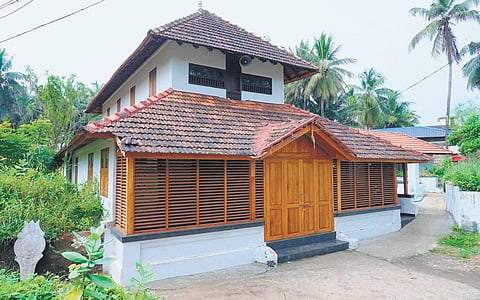500-year-old symbol of Kerala’s fight against Portuguese gets Rs 85 lakh facelift
MALAPPURAM: The historic town of Ponnani in Malappuram is renowned for its rich cultural diversity, maritime trade legacy, and its status as a hub of Islamic education and spirituality.
Home to landmarks like the Juma Masjid (Valiya Jumath Palli) and Thrikkavu Durga Bhagavathi temple, Ponnani is a favourite of hundreds of tourists who arrive every year to experience and understand the town’s cultural heritage.
In this town lies a monument that serves as a symbol of the alliance forged by the Zamorin, Egyptian navy officers and Kunjali Marakkar I to repel invading Portuguese forces.
The Misri Palli mosque, built over 500 years ago in the 16th century, was opened to the public recently after an extensive renovation spanning a little over two years and costing Rs 85.5 lakh. “The Misri Palli was built for navy officials or people who came to Ponnani from Egypt. Before the arrival of Vasco da Gama to Kerala, Hindus and Muslims lived in harmony in Malabar under the Zamorin’s rule. However, the Portuguese, aiming to expand their influence, sought to disrupt this,” said T V Abdurahman Kutty, a historian in Ponnani.
He said trade activities in the region, predominantly conducted by the Muslims, attracted the attention of the Portuguese and in the early 1500s, they targeted the Muslims, leading to tensions.
‘Such mosques hold historical value, protecting them crucial’
“During this period, scholar Sheikh Zainuddin Makhdoom I returned to Ponnani from Egypt, while Kunjali Marakkar I arrived from Kochi. Recognising the need to defend Kerala’s shores against the Portuguese aggression, the Zamorin, Zainuddin, and Marakkar joined hands to form an army to resist the Portuguese,” Abdurahman Kutty said. He said the army successfully repelled multiple attacks from the Portuguese.
Zainuddin also invited Navy officers from Egypt to Ponnani to join their fight. “It was during this time that the Misri Palli was constructed for accommodating the arriving Egyptian officers,” said Abdurahman.
Misr is Arabic for Egypt, said Abdurahman, adding, “So, people call the mosque used by Egyptians as Misri Palli.” In 2019, a few members of the mosque committee tried to get the original property demolished and replace it with a concrete structure. However, then Speaker P Sreeramakrishnan intervened and prevented the demolition. Subsequently, the mosque was included in the list of protected monuments for ensuring its preservation and safeguarding its historical significance. The renovation work kicked off in February 2020 and the mosque was opened to the public on June 10 this year.
Since then, it has turned into a popular tourist destination attracting a large number of people every day. Residents of Ponnani also use the mosque as a place of worship regularly.
“Protecting such mosques is crucial as they hold significant historical value and serve as a means of transmitting our history to future generations. For Misri Palli, the state government implemented various measures to ensure its distinctive architectural style, a fusion of traditional Kerala architecture with Islamic design influences, is preserved,” said Sadhik Sagos, a local politician.
Alternative origin story
According to another account, the construction of Misri Palli is attributed to traders from Egypt who survived a shipwreck and reached the shores of Ponnani. Thankful for their lives, the traders had pledged to build a mosque in Ponnani as an expression of gratitude.

